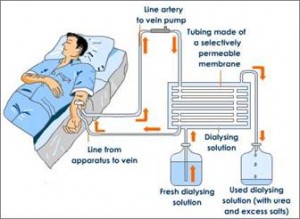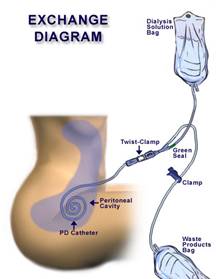-
Dialysis: Treatment for Kidney Failure
- Posted on December 13, 2011
- by Postmaster
- in Uncategorized @en
- No Comments.
Treatment Kidney Failure
Healthy kidneys clean your blood by removing excess fluid, minerals, and wastes. They also make hormones that keep your bones strong and your blood healthy. When your kidneys fail, harmful wastes build up in your body, your blood pressure may rise, and your body may retain excess fluid and not make enough red blood cells.
When your kidneys fail, you need a treatment to replace the work of your failed kidneys.
This treatment is called: dialysis.Treatment Kidney Failure: HAEMODIALYSIS
Haemodialysis usually involves using the dialysis machine three times a week, with each dialysis session lasting for about 4 hours.
If you choose to have haemodialysis, you then will have to decide whether you want to receive treatment at home or visit a dialysis center for treatment.
Haemodialysis is usually recommended for people, such as those who:
- are visually impaired
- have dementia
- are in a poor state of health
Disadvantages:
- Limitation of traveling overseas ? you have to arrange access to dialysis facilities prior to your departure.
- You have to follow diet and restrict the amount of fluid that you drink.
Treatment Kidney Failure: PERITONEAL DIALYSIS
Peritoneal dialysis is usually recommended as the first form of treatment for:
- children who are two years of age or above
- people who still have some limited kidney function
- adults who do not have other serious health conditions, such as heart disease or cancer
CAPD (continuous ambulatory peritoneal dialysis) doesn’t require a machine. As the word ambulatory suggests, you can walk around with the dialysis solution in your abdomen. You may need about 4 exchanges a day. Each exchange lasts about 30-40 minutes.
APD (automated peritoneal dialysis) requires a machine called a cycler to fill and drain your abdomen, usually while you sleep.
Main advantages:
- More freedom for traveling ? you don’t need to visit a dialysis center every week
- Fewer restrictions on diet and fluid intake compared with haemodialys where there are strict limits on the amount of fluids that you can drink.
Disadvantages:
Increased risk of developing peritonitis (infection in the peritoneum).
Peritonitis causes symptoms that include:- abdominal pain
- vomiting
- chills (episodes of shivering and cold)
Repeated episodes of peritonitis can damage the peritoneum and may require a surgery. Another drawback is lack of energy and in some cases malnutrition.
Compiled by: wordpress/kidney
Source:
http://www.nlm.nih.gov/medlineplus/dialysis.html
http://www.nhs.uk/Conditions/Dialysis/Pages/Advantages-and-disadvantages.aspx
http://netclass.csu.edu.cn/jpkc2004/neike/picture/jjgg_syjx_crf2.jpg
http://kidney.niddk.nih.gov/kudiseases/pubs/peritoneal/
If you enjoyed this article please consider sharing it!
Recent Posts
- DIET GAGAL GINJAL KRONIS
- Obat Gagal Ginjal
- Sun Kidney
- Penyakit Ginjal Kronis (CKD)
- Dialisis untuk Gagal Ginjal






